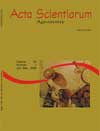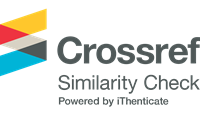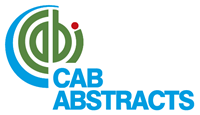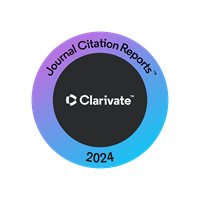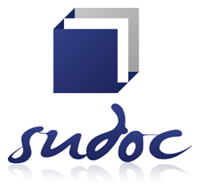<b>Remoção do meristema apical e adensamento em plantas de soja visando sua utilização no método descendente de uma única semente</b> - DOI: 10.4025/actasciagron.v31i1.6656
Resumo
Objetivou-se verificar a eficiência da remoção do meristema apical em diferentes densidades de plantas de soja, quanto ao estímulo à ramificação, à produção de sementes na maior densidade e à redução da altura da planta, buscando estratégias de cultivo em casa-de-vegetação para fins de melhoramento genético pelo método SSD, com a cultivar UFV-18 (Patos de Minas), na safra 2002/2003. O ensaio foi instalado em parcelas subdivididas, sendo a densidade casualizada nas parcelas e a remoção do meristema casualizada nas subparcelas, no delineamento em blocos casualizados, com três repetições. Cada vaso constitui-se em uma repetição. Foram avaliadas as características altura de inserção da primeira vagem, altura da planta, número de nós da haste principal, número de ramificações/planta, número de vagens/planta, número de sementes/planta e peso de 100 sementes. A remoção do meristema apical, quando realizada no 6º trifólio, foi mais eficiente estimulando a ramificação, reduzindo a altura da planta e da primeira vagem. A remoção do meristema apical realizada no 6º trifólio, na densidade de dez plantas/vaso, permitiu a produção de pelo menos uma vagem por planta viabilizando o uso do método SSD em casa-de-vegetação.Downloads
DECLARAÇÃO DE ORIGINALIDADE E DIREITOS AUTORAIS
Declaro que o presente artigo é original, não tendo sido submetido à publicação em qualquer outro periódico nacional ou internacional, quer seja em parte ou em sua totalidade.
Os direitos autorais pertencem exclusivamente aos autores. Os direitos de licenciamento utilizados pelo periódico é a licença Creative Commons Attribution 4.0 (CC BY 4.0): são permitidos o compartilhamento (cópia e distribuição do material em qualqer meio ou formato) e adaptação (remix, transformação e criação de material a partir do conteúdo assim licenciado para quaisquer fins, inclusive comerciais.
Recomenda-se a leitura desse link para maiores informações sobre o tema: fornecimento de créditos e referências de forma correta, entre outros detalhes cruciais para uso adequado do material licenciado.





